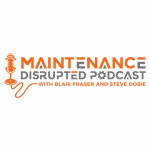
MD 139 Digital Technology Discussion with John Saldatos from Greece
In this podcast, we invite John Saldatos a thought leader in the space of digital technology from Greece to cover basic understanding and application of some of the major technologies coming our way. We cover topics like blockchain, AI, AR/VR, 5G, and scratch the surface on quantum computing. If you are a tech nerd like me, this will be a great podcast, I hope you enjoy it!
Connect with our guests here:
John Saldatos: https://www.linkedin.com/in/johnsoldatos/
If your company sells products or services to engaged maintenance & reliability professionals, tell your marketing manager about Maintenance Disrupted. If you’d like to discuss advertising, please email us at maintenancedisrupted@gmail.com
Check out our website at www.maintenancedisrupted.comand sign up for the weekly disruption newsletter with bonus content. If you like the show, please tell your colleagues about it and follow maintenance disrupted on LinkedIn and YouTube.
Follow Maintenance Disrupted on LinkedIn
https://www.linkedin.com/company/maintenancedisrupted
Music: The Descent by Kevin MacLeod
Link: https://incompetech.filmmusic.io/song/4490-the-descent
License: http://creativecommons.org/licenses/by/4.0/










 Ask a question or send along a comment.
Please login to view and use the contact form.
Ask a question or send along a comment.
Please login to view and use the contact form.